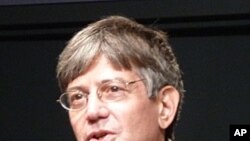A top U.S. State Department official has urged China to make it clear to North Korea that there are consequences for its actions. The remarks from Deputy Secretary of State James Steinberg are but the latest in a string of calls from the Obama administration for Beijing to put more pressure on Pyongyang.
In the coming days Steinberg will lead a U.S. delegation to China and the region to address the North Korea situation.
Speaking at the Center for American Progress on Tuesday in Washington, Steinberg stressed the crucial role China could play. "The recent tensions on the peninsula, which have been caused by a series of provocations by North Korea, highlights the need for strengthened regional cooperation and in that context for strong U.S. - China cooperation on this important strategic issue," he said.
Steinberg said a strong message urging North Korea to show restraint is needed. "That is what's creating the instability and the fragility. The tensions that we see and the dangers that we see, come from the fact that there does not seem to be effective restraints on North Korea engaging in these provocations," he said.
Tensions have been rising on the Korean peninsula, following North Korea's announcement of new advances in its nuclear program and its shelling of a South Korean island late last month, that killed four people.
And in turn, tensions there have spilled over into U.S - China relations as the United States and other countries in the region look to China for support. China is a key diplomatic ally of North Korea and major supplier of energy and food aid.
So far, China has refused to criticize the North over its actions and focused its efforts on re-starting dialogue.
Beijing has called for an emergency meeting of participants in the six-party talks - negotiations aimed at ending North Korea's nuclear weapons program - to help cool the situation. That appeal, however, was rejected by the U.S., Japan and South Korea who say they are waiting for Pyongyang to first cease all its "provocative and belligerent behavior."
Some China analysts say the Obama administration needs to use Chinese President Hu Jintao's important upcoming visit to Washington to push Beijing to do more. In an editorial on Tuesday, the U.S. newspaper, the Wall Street Journal even suggested that the President Obama cancel the invitation for the visit until China agrees to stop serving as what it said was "Pyongyang's accomplice."
Steinberg said that it is not a question of using leverage on China to get it to change its views, but a matter of shared interests. "We have a shared interest in making sure that North Korea lives up to its past commitments on denuclearization and stops engaging in provocative behavior which threatens the security of all the countries in the region. So we have a common set of interests and now we have to find a common pathway forward," he said.
Steinberg said that while newspapers seem to be portraying the U.S.-Chinese relationship as experiencing a serious downturn or freeze, he believed both sides would find a way to work together.
US Repeats Calls for China to Put Pressure on N. Korea




